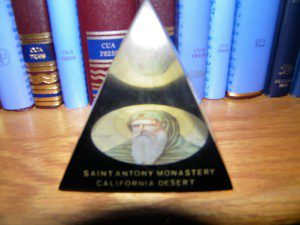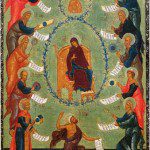
Some say of Saint Anthony that he was “Spirit-borne,” that is, carried along by the Holy Spirit, but he would never speak of this to men. Such men see what is happening in the world, as well as knowing what is going to happen.[1]
Among the way people came to know the greatness of St. Anthony was that he had become filled with the Holy Spirit. In his humility, he did not speak of it. And yet the Holy Spirit would reveal itself to others in and through him; he was its willing servant. And yet, this presence of the Spirit, enabling him to be a spirit-bearer, was not something which was always with him. He, like all of us, had to work out his own salvation with much fear and trembling, cooperating with the Spirit in order to become a great spirit-bearer of his age. Elijah, Elias, David, John the Baptist, and many others before him had become filled with the Spirit and revealed the glory of God in their lives. Anthony would follow after them, go into the quiet of the desert, wrestle with God, and emerge, filled with the Spirit.
What Anthony achieved is something which is open to all of us, even if only a few attain it before death. St. Seraphim of Sarov said that the acquisition of the Holy Spirit is the goal of the Christian life. It cannot be a goal if it is impossible. We must open ourselves to the Spirit, follow the promptings of the Spirit, so that we can live our lives in such a way that nothing we say are do is done apart from the Spirit. Until we have achieved this, we must seek out the Holy Spirit with all that we are, to bring its holiness in our lives, radiating that holiness to others thanks to mysterious gifts granted to us by that same Spirit:
Prayer, fasting, vigil and all other Christian practices, however good they may be in themselves, do not constitute the aim of our Christian life, although they serve as indispensable means of reaching this end. The true aim of our Christian life consists in the acquisition of the HOLY SPIRIT OF GOD. As for fasts, vigils, and prayer, and almsgiving, and every good deed done for Christ’s sake, they are only means of acquiring the Holy Spirit of God.[2]
This, we learn, was exactly what St. Anthony was able to do. He fought the spiritual fight for years, and through the grace of God working with him, he became one of the few great spirit-bearers of his time.[3] All are called for this greatness, even if only a few attain it. For anyone who reaches this state of unity with God, they become a thing of amazement, reflecting in them greater glory of God which they participate in. St. Athanasius described the implications of Anthony’s holiness by revealing what happened in him as a result of his training in solitude – he was not only filled with wisdom, capable of great spiritual direction, but God also worked many great miracles through him :
And so for nearly twenty years he continued training himself in solitude, never going forth, and but seldom seen by any. After this, when many were eager and wishful to imitate his discipline, and his acquaintances came and began to cast down and wrench off the door by force, Antony, as from a shrine, came forth initiated in the mysteries and filled with the Spirit of God. Then for the first time he was seen outside the fort by those who came to see him. And they, when they saw him, wondered at the sight, for he had the same habit of body as before, and was neither fat, like a man without exercise, nor lean from fasting and striving with the demons, but he was just the same as they had known him before his retirement. And again his soul was free from blemish, for it was neither contracted as if by grief, nor relaxed by pleasure, nor possessed by laughter or dejection, for he was not troubled when he beheld the crowd, nor overjoyed at being saluted by so many. But he was altogether even as being guided by reason, and abiding in a natural state. Through him the Lord healed the bodily ailments of many present, and cleansed others from evil spirits. And He gave grace to Antony in speaking, so that he consoled many that were sorrowful, and set those at variance at one, exhorting all to prefer the love of Christ before all that is in the world. And while he exhorted and advised them to remember the good things to come, and the loving-kindness of God towards us, ‘Who spared not His own Son, but delivered Him up for us all,’ he persuaded many to embrace the solitary life. And thus it happened in the end that cells arose even in the mountains, and the desert was colonised by monks, who came forth from their own people, and enrolled themselves for the citizenship in the heavens.[4]
From his life and sayings, we hear many examples of Anthony’s unusual spiritual knowledge, where he truly was able to see into and experience the spiritual world and speak of it to others. He was prophetic, speaking with God and for God, but he was also guided by God and strengthened by God to see the spiritual foundations which guide and shape the material world. He could see when God was helping inspire someone else, but he could also see and dispel demonic presences when needed, exposing them for their pretense. Philosophers would come to debate him only to find that his wisdom and knowledge was greater than what they had gained from all their study. He was Spirit-borne, representing the ideal life in the Spirit which we all should seek. It is possible in this life, and not just something we are to attain in death.
But we must remember, the spiritual life is one of much trial and tribulation. We will find joy, and it will come from the Spirit, but then we will be tested, tried and made true. Like the experience of St. Teresa of Calcutta, we will find that our initial joy, filled with the light of the Spirit, will leave us, not because we have been abandoned and rejected by God but rather, the reverse; it is, as St. Ammonas indicated, the sign that God has taken us into himself and is truly working with us, preparing us to truly become his spirit-borne children:
You must know how, in the beginning of the spiritual life, the Holy Spirit gives people joy when He sees their hearts becoming pure. But after the Spirit has given them joy and sweetness, He then departs and leaves them. This is a sign of His activity and happens with every soul that seeks and fears God: He departs and keeps a distance until He knows whether they will go on seeking Him or not. Some, when He moves away from them, are weighed down, and sit in their heaviness without moving; for they do not ask God to remove the weight from them, and to give them again the joy and sweetness they had known; but, as a result of their own neglect and self-will, they are alienated from the sweetness of God. [5]
This is normal. This is exactly what happens to those who love God. The friends of God will know God’s darkness, which will come to them as a time of great tribulation. And yet in and through such darkness, his saints will grow in spirit, and slowly find themselves capable of seeing the work which God has been doing in and with them. As they will grow, they will slowly find themselves adjusting to the work of God in their lives and see it is not that God has abandoned them and sent them back into the darkness of sin, but rather, he had encased them within himself, in his great light which will make it appear as all things have gone dark. In this bright darkness, then, we will find ourselves growing in Spirit, and acquiring the Spirit, with the discernment the Spirit is capable of bringing to us when we are truly in tune with it.[6] “And to the souls in which He dwells, He will reveal great mysteries, and day and night will be alike for them.”[7]

What St. Anthony achieved is what we are all called to achieve. It was not a short, easy journey; indeed, like all of us, at times he felt abandoned by God only to find that God was working with him, testing him, waiting to see how strong Anthony would be able to be in the end. To be Spirit borne is to be open to God, but to be open to God, we must be cleansed of all the darkness and filth within. We must go into the fire of God. We must be consumed by God. In that consumption, the fire will burn bright and blind us, but then we, too shall become like fire and see all things and know all things in and through God’s light. [8]
[1] The Sayings of the Desert Fathers. trans. Benedicta Ward (Kalamazoo, MI: Cistercian Publications, 1984), 7.
[2] N.A. Motovilov, “The Acquisition of the Holy Spirit” in Little Russian Philokalia. Volume I: St. Seraphim (New Valaam Monastery, Alaska: St. Herman’s Press, 1991), 86.
[3] This was what his disciple noted, that is,“Not many have been accounted worthy even of the spirit of penitence; but the Spirit of Truth dwells in only a few souls in each generation,” Ammonas, The Letters of Ammonas: Successor of St. Antony. trans. Derwas J. Chity. Revised Sebastian Brock (Oxford: SLG Press, 1995), 20 [Letter XIII].
[4] St.Athanasius, Life of Antony in NPNF2(4):200.
[5] Ammonas, The Letters of Ammonas: Successor of St. Antony. trans. Derwas J. Chity. Revised Sebastian Brock (Oxford: SLG Press, 1995), 12-13 [Letter IX].
[6] “Trials will attach themselves to everyone who attaches himself to the Spirit of God, but as a result he acquires discernment and a different sort of splendour,“Ammonas, The Letters of Ammonas: Successor of St. Antony. trans. Derwas J. Chity. Revised Sebastian Brock (Oxford: SLG Press, 1995), 13 [Letter X].
[7] Ammonas, The Letters of Ammonas: Successor of St. Antony. trans. Derwas J. Chity. Revised Sebastian Brock (Oxford: SLG Press, 1995), 20-21 [Letter XIII].
[8] “Abba Lord went to see Abba Joseph and said to him, ‘Abba, as far as I can say my little office, I fast a little, I pray and meditate, I live in peace and as far as I can, I purify my thoughts. What else can I do?’ Then the old man stood up and stretched his hands towards heaven. His fingers became like ten lamps of fire and he said to him, ‘If you will, you can become all flame,’” The Sayings of the Desert Fathers. trans. Benedicta Ward (Kalamazoo, MI: Cistercian Publications, 1984), 103.












